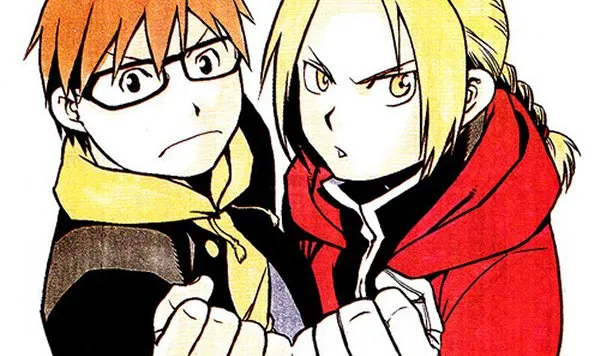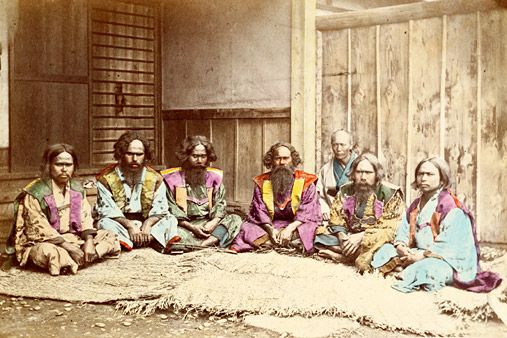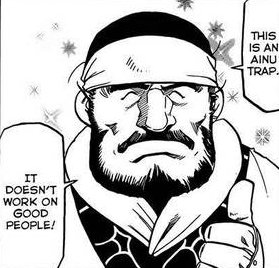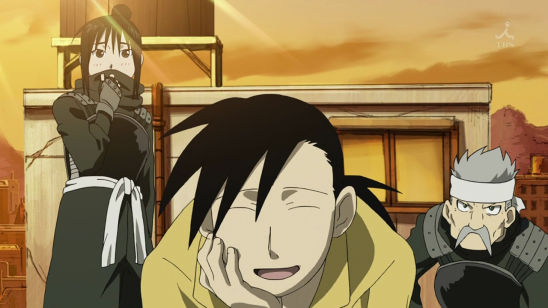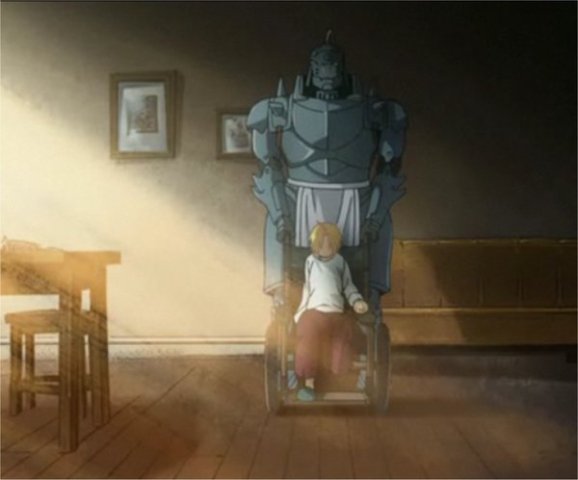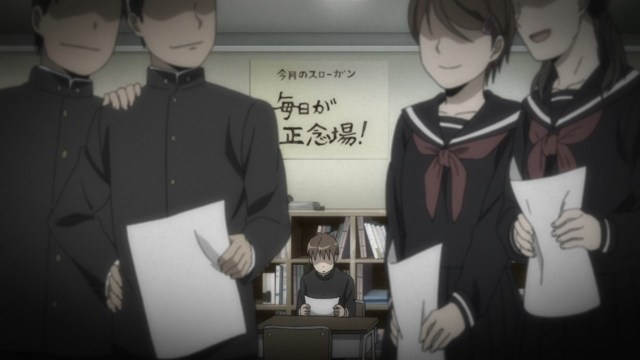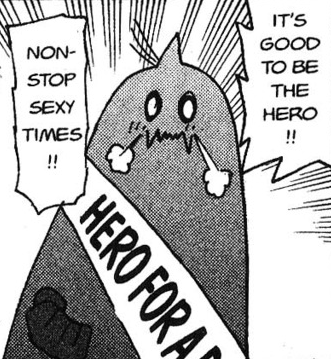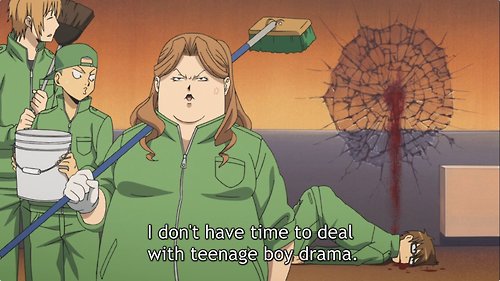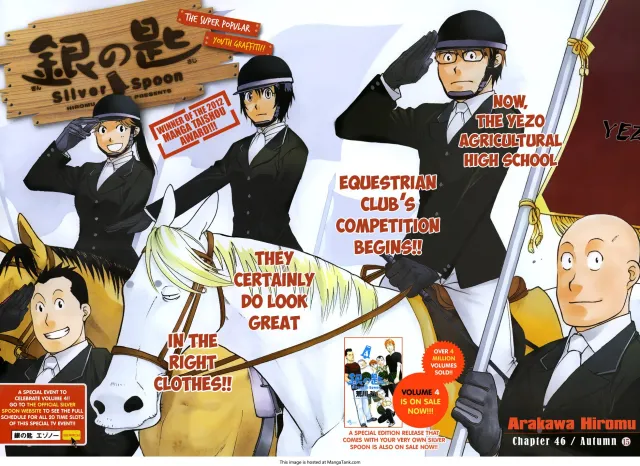My last article about Hiromu Arakawa told you all about how she is an extremely successful artist with an impressive body of work. Since her series are highly regarded and popular, she is doubtless making an impact on the shonen (boy’s) manga industry. But what is it that makes her work compelling? What makes it special? What are the recurring themes and what kind of worldview does her work reflect? This article will dig into exactly that by looking at Arakawa’s two major works—Fullmetal Alchemist and Silver Spoon.
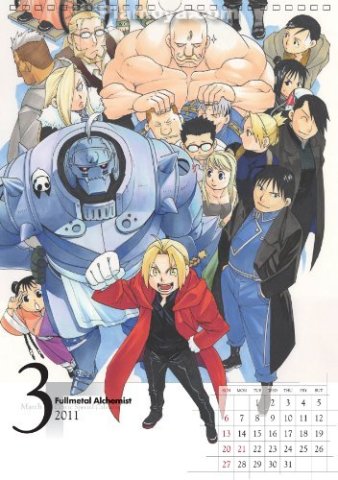
The basic story of Fullmetal Alchemist is that two brothers (Edward and Alphonse Elric) attempt to use a forbidden form of alchemy to bring their mother back to life. As a result, Alphonse loses his entire body and Edward loses two of his limbs. Having sealed his brother’s soul in a suit of armor, Ed has his childhood friend Winry outfit him with cybernetic limbs (“automail”) and becomes an alchemist in the employ of the military so he can find the secret to restoring what he and his brother have lost. But they end up uncovering way more than they bargained for…
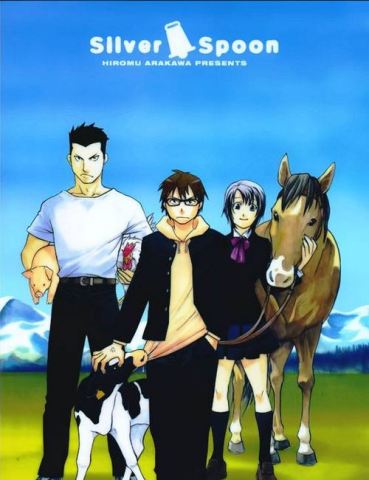
Arakawa’s later manga, Silver Spoon, is a slice-of-life story. Yugo Hachiken applies to an agricultural boarding high school in order to escape his overbearing father and the pressures of academics. He quickly falls for a girl named Aki Mikage. Since she is a hardworking horsewoman, he is inspired by her to join the horseback riding club. He ends up finding that many aspects of farming and taking care of livestock are incredibly foreign to him. Things get even more difficult when his personal issues start to catch up with him.
Now that we’ve introduced the basics, it’s time to discuss the meat of the stories and the thematic elements in both of them.
Racial Oppression
Racial oppression is a common theme in Arakawa’s work for a very specific reason. She grew up in Hokkaido, Japan’s second largest island and an agricultural powerhouse. It has a long history, and not all of it is pleasant. Arakawa admitted in an interview that her interest in the subject of racial oppression comes from growing up in a place that historically oppressed the Ainu, or the aboriginal people of Hokkaido, who were displaced by the Japanese and had their land taken from them.
A picture of a group of Ainu people circa the 1860s, via Wikimedia Commons
Arakawa notes that her own ancestors were the ones who displaced the Ainu, yet some of her relatives are part-Ainu now. It’s hard to tell whether this means she herself has Ainu blood, or if people of mixed race have married into her family, but it is clear that her family’s history with the Ainu prompted her to raise awareness about the issue.
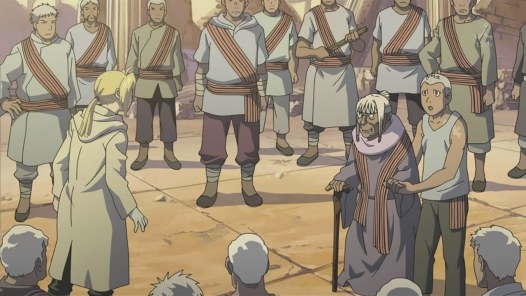
A group of Ishvalans surrounding Edward Elric
You can see echoes of this history in Fullmetal manga, where “Amestrian” racial majority oppresses the darker-skinned “Ishvalan” minority to the point of having nearly wiped them out. “I think the truly serious problems in this world are when people don’t make any effort to learn about these everyday situations, when they turn away from them or view them from only a single perspective,” Arakawa stated.
A panel from Silver Spoon, featuring an Ainu character
She also included an Ainu character in a flashback chapter of Silver Spoon that took place in historical Hokkaido. The racial oppression the character faced was discussed.
Arakawa’s handling of racial oppression has been both praised and criticized, but she certainly does seem sincere in her desire to raise awareness about the issue and to face it head on. She also doesn’t shy from depicting the brutality of genocide. In Fullmetal Alchemist, she does not present the issue from a single perspective but rather from many different characters’ points of view.
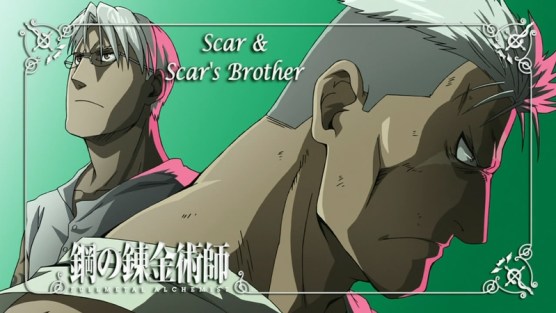
Scar, the most prominent Fullmetal Ishvalan character, and his brother
Fullmetal charts the character arc of the vengeful survivor Scar, shows the perspective of the mixed-race Miles, and features characters who are ignorant of their own role in perpetuating violence and oppression as well as those who come to acknowledge it. She acknowledges in her work that there are no easy answers.
The Value of Anger
Perhaps the most interesting aspect of Arakawa’s exploration of oppression is that she stresses the valueof anger and the legitimacy of not forgiving your oppressors. In Fullmetal, an Ishvalan character talks to his student about how he should deal with the oppression their people have faced, saying “I am not asking you to forgive. It is our duty to be angry at the injustices of the world. But you must endure.” Arakawa’s message seems to be that anger is unavoidable and necessary, but it must be used constructively in an attempt to change society, rather than lashing out for the sake of revenge or self-destruction.
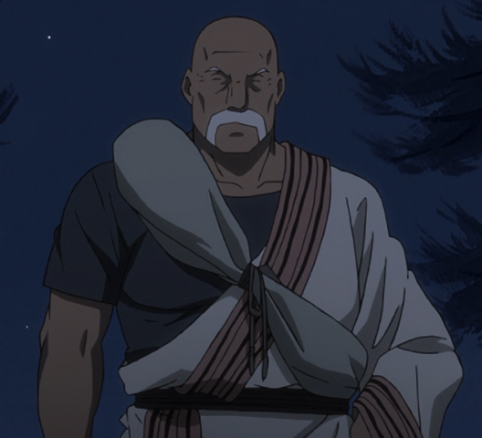
Scar’s teacher from Fullmetal Alchemist
Again, this message in her work and whether it was executed properly within her narrative has been debated. The issue is incredibly complex. But it is at least nice that Arakawa understands the value of anger and acknowledges forgiveness isn’t always the answer. She even actively encourages her readers to value their anger, with her own words in the back of one of the Fullmetal manga volumes:
“We adults are angered by the senseless things that happen every day in this world… but at the same time we repress those feelings by telling ourselves ‘there was no other choice’ or ‘there must have been a reason for it.’ But it’s a natural human reaction to be outraged when senseless things happen. Some things can’t be justified or rationalised. I want boys and girls to grow up valuing those feelings.”
Family
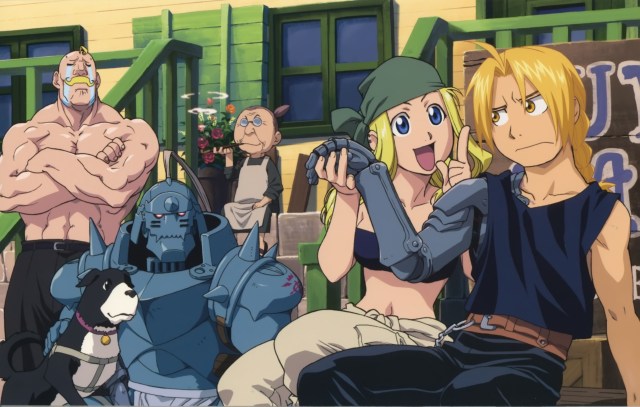
The Elric brothers with their surrogate family. From left to right: Alex Armstrong, Alphonse, Pinako, Winry, Edward.
The importance of family and people supporting each other is another common theme in Arakawa’s stories. She believes not only in exploring biological family but also in the power of a found family. In one interview she spoke about how Fullmetal‘s Winry and Pinako Rockbell essentially adopted the Elric brothers after they lost their parents. While Ed and Al say they have no place to return to, the reality is that there are people ready to welcome them back, and it is that support that gives them the will to go on.
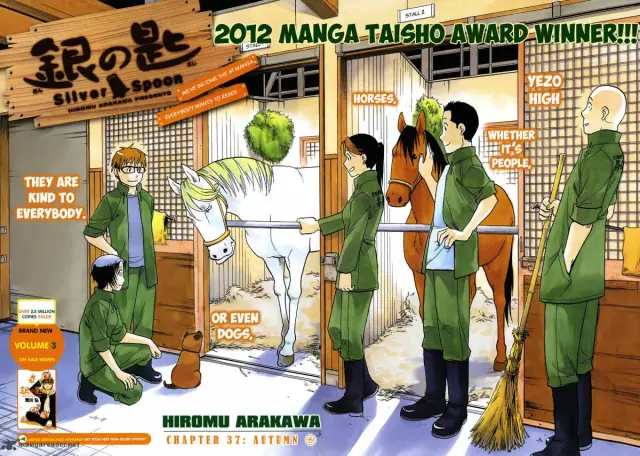
In Silver Spoon, Hachiken leaves home because of difficulties with his biological family but finds a family of his own creation with the students and teachers of his agricultural high school, who support him during his time of need. With their help, he even makes strides in repairing his relationship with his blood family.
Arakawa’s work shows that family comes in all sorts of forms, and even those who have broken ties with or lost their biological family can still find a true family. Arakawa says that she believes the sort of support that these surrogate families give, regardless of biological bonds, is how society should work in the larger sense. She feels that people supporting and helping each other in times of need is the most powerful thing.
People of Different Backgrounds Learning from Each Other
The Fullmetal Alchemist manga is largely about people of many different backgrounds, cultures, and walks of life coming together to support each other and work together to achieve great things. A huge part of the brothers’ development is them coming to understand that they are not alone, that the world is much larger than them and their problems, and that there are many things out there to discover and many people they can network with.
Three of the Xingese characters. From left to right: Lan Fan, Ling Yao and Fu.
Later in the Fullmetal manga, the Elric Brothers (who are from the European-like country of Amestris) meet up with characters who have traveled from the China-like country of Xing, and interacting with people who are products of another culture ends up broadening the brothers’ worldview. Xing has its own specific and valuable form of alchemy, and the brothers gain a lot of essential knowledge by opening themselves up to that.
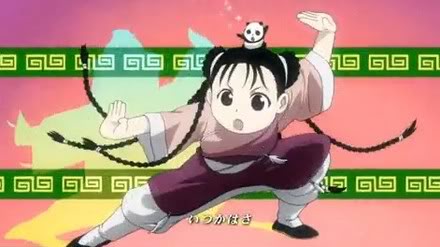
May Chang, another Xingese character
The Xingese people in the story are in the country illegally, and there are some subtle allusions to prejudice from more villainous characters, but ultimately these Eastern “illegal immigrants” end up being essential to resisting and challenging the corruption of the Western country the Elrics reside in. Arakawa’s inclusion of these characters not only allows her to demonstrate that there is a wider world within her story , but it demonstrates the importance of understanding between different cultures.
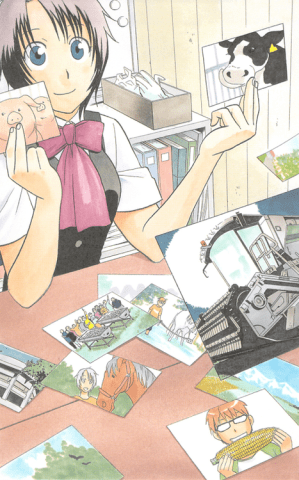
Aki Mikage from Silver Spoon
Silver Spoon similarly encourages the idea of interacting with people from different backgrounds and considering their experiences. But in Hachiken’s case, he is exposed to a different way of life through interacting with the farming community and coming to realize the class difference between him and his friends, learning that they face economic difficulties he can’t possibly imagine.
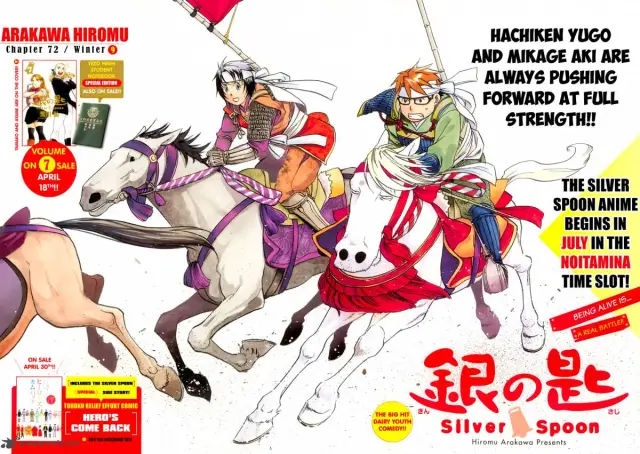
Hachiken and Aki
Hachiken comes to understand and appreciate a farmer’s way of life and becomes better for the experience. He also doesn’t turn away from the issue of class he is confronted with. He immerses himself in the community’s problems and does his best to support his friends. He admits he comes from a place of unfamiliarity (and privelige) but states “I may not ever get it, but I never want to stop trying to understand.” Arakawa challenges her readers to listen to people of different economic backgrounds and to give them understanding and support.
A Diversity of Experiences
Arakawa thoroughly researched her work, interviewing and interacting with people of many different backgrounds. For example, she worked with people with physical disabilities in order to better represent the many physically disabled characters in Fullmetal.
Young Edward Elric in a wheelchair
Despite the fact that part of the story of Fullmetal initially seemed to be about its characters trying to magically repair their disabilities, what plays out is actually far more complicated and interesting. A character even gives a speech about how lots of people live with difficulties and that their lives can be just as full, especially if there are people to provide them with love and support. Many of the characters in Fullmetal end up living with permanent disabilities.
Arakawa also worked with refugees and interviewed former yakuza (the Japanese mafia), foreigners living in Japan, and many others.
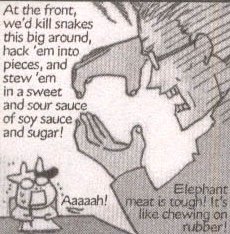
Arakawa draws herself (as a cartoon cow) interviewing a war veteran in volume 15 of Fullmetal
Arakawa also thoroughly researched corruption in the military and the horror of war. In volume 15 of her manga, she discussed talking with with veterans of World War II. She said her most sobering experience was when a veteran told her “I can’t watch war movies anymore.” A few characters in her manga show symptoms of PTSD after their wartime experiences.
The Importance of Valuing Yourself
Much of fiction encourages the idea of sacrificing your life as being inherently noble and also promotes the idea that if you’re in a bad situation, you need to always face that head-on. This is an especially common thing to see in action-oriented shonen.
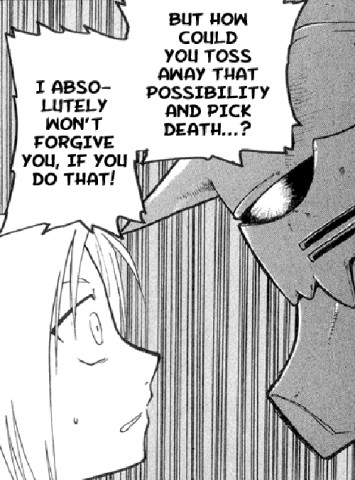
Al yells at his brother for trying to sacrifice himself
Arakawa’s work challenges that idea and examines the consequences of self sacrifice. The characters in her work are confronted with the fact that their lives have value to the people they love. In Fullmetal, the consequences of ending your life, even to protect another, are fully explored. It’s acknowledged that such an action will inevitably leave your loved ones in a lot of guilt and pain and sometimes rob them of their only family. It stresses that it’s not just important to consider the safety of your loved ones, but to respect their feelings and wishes, which is why when Al and Winry urge Ed not to ever accept death and sacrifice himself for them, Ed takes them seriously.
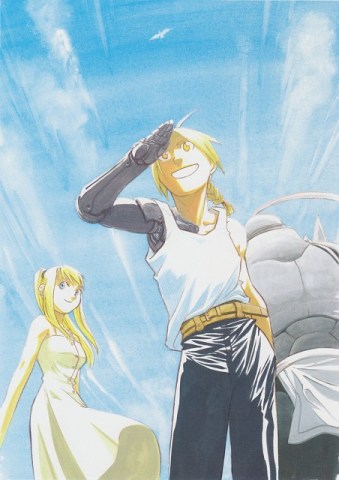
Winry, Ed, and Al, from the Fullmetal Alchemist Art Book Vol. 2
It’s also stressed that ending one’s life means destroying all the potential good you could have gone on to accomplish. It’s more important to live for the world than to die for it. Self-sacrifice should be a last resort, not a first one, because every life has value. With suicide such a pervasive tragedy worldwide—and a huge social issue particularly in Japan, which has a relatively high suicide rage—this is an important to stress to young people.
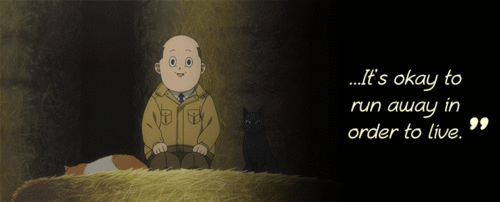
Gif from the Silver Spoon anime by ochinchin-tan
In Silver Spoon, Arakawa tells young people that there is no shame in leaving a situation that negatively effects their emotional health. Hachiken is ashamed for running away from the pressure his family and school put on him rather than forcing himself to endure it, but an adult tells him “Don’t look down on yourself for running away. Make it meaningful by making something out of it. It’s okay to run away in order to live.”
It’s surprisingly rare to have fiction stress to its reader that they don’t have feel ashamed for not staying with situations that are making them feel pressured or unhappy—but that’s exactly what Arakawa does. She encourages her reader to put their emotional health first and lets them know they can find something fulfilling in leaving a bad situation to find a place they belong.
Hachiken
It’s also important that she explicitly ties this message to a boy who was basically on the verge of breaking under academic pressure, which is a substantial contributing factor to the high youth suicide rate in Japan. I have myself often struggled with the value of my own life, so cultural context aside, my personal view is the philosophy Arakawa promotes in her work is one that anyone can benefit from hearing.
Working for a Better World
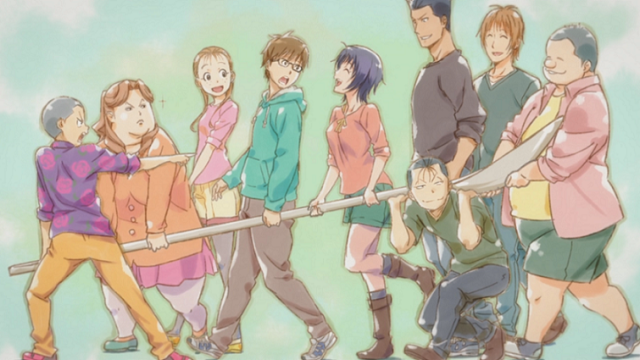
The cast of Silver Spoon
Arakawa does not shy away from showing the brutality and horrors humanity is capable of, but every inch of her story shines with the hope for a better world and belief in the potential of humanity. She acknowledges there will always be pain but promotes the idea of learning from the pain of the past to try to make a better future.
Her work tends to encourage the idea of working for a better world and not wallowing in self-pity. She has characters in Fullmetal who admit to having done things that they could never possibly atone for, yet they acknowledge the importance of using what’s left of their lives to work for an improved world where the atrocities they committed cannot be repeated.
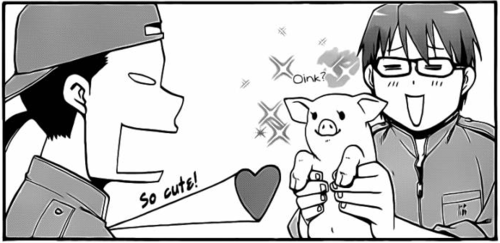
The boys in Silver Spoon gush over cute piglets
Arakawa also stresses that she doesn’t want to overwhelm her readers with tragedy. Her belief is that an entertaining manga should have fun with itself, and she wants people to ultimately feel joy when they read her work.
Humor
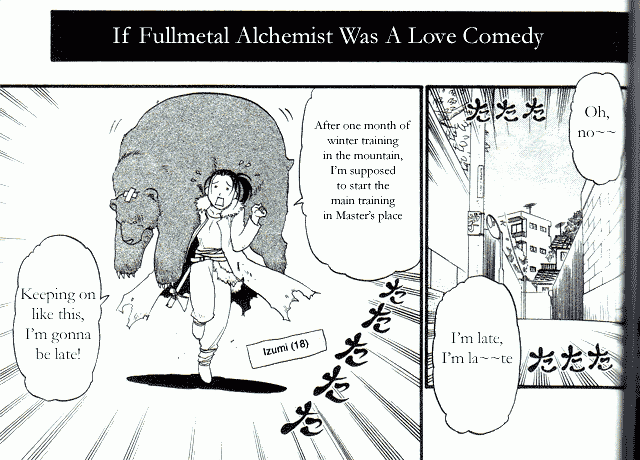
Arakawa speculates that if Fullmetal were a romantic comedy, Elric’s mentor Izumi would be adorably late because she was busy fighting a bear.
Nobody has mastered the art of making a reader cry from laughter in one page and then ripping their heart out in the next more than Arakawa.
In one of the Fullmetal extras, Al discovers the best reason to be a main character.
The gag comics she includes in the back of her manga, which often play around with common stereotypes and tropes, are worth the price of the whole book. For example, Alex Louis Armstrong often serves to parody the shirtless, muscle-bulging manly man aesthetic that is pervasive in action shonen.
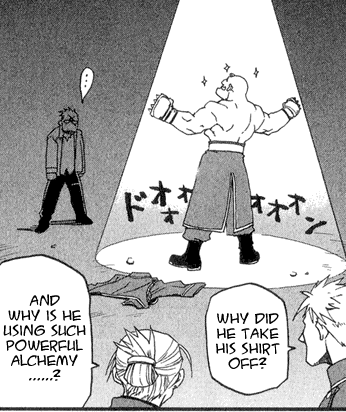
Alex Armstrong takes macho posturing to a whole new level.
And characters that would be amazingly cool all the time in other manga show themselves to be capable of massive dorkiness. Look at the suave ladies’ man/flame alchemist Roy Mustang, who is shown to be useless in the rain and not really much of a ladies’ man at all.
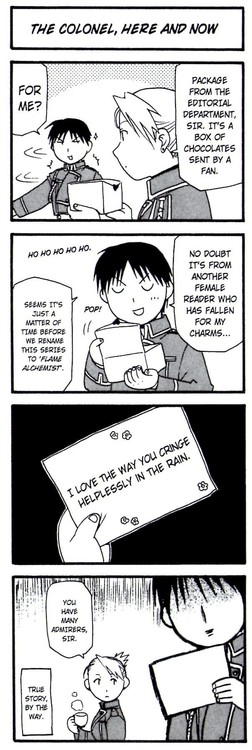
Roy Mustang discovers his real romantic appeal in an extra.
A lot of the humor that surrounds the character Tamako in Silver Spoon is not tired and offensive humor regarding her weight, but just about what a ridiculous badass she is.
Tamako has better things to do than deal with teen angst
However, please be aware there are instances of stereotyped humor in Arakawa’s manga. The only canonically gay character in Fullmetal is basically a “humorous” stereotype. The boys in Silver Spoon do initially make some bad comments about Tamako’s weight, even if they eventually stop. And there are a few jokes in Silver Spoon about teenage boys being perverted about girls (though in some cases the female characters call them on it, and sexual harassment is never depicted).
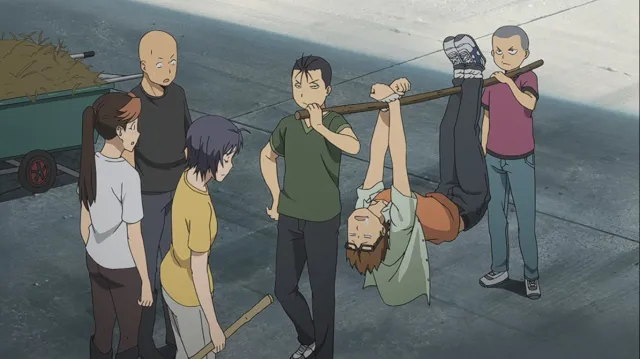
Poor Hachiken goes through a lot
Arakawa also employs a lot of the slapstick humor typical in shonen manga, including characters comically attacking each other, which isn’t for everyone.
Conclusion
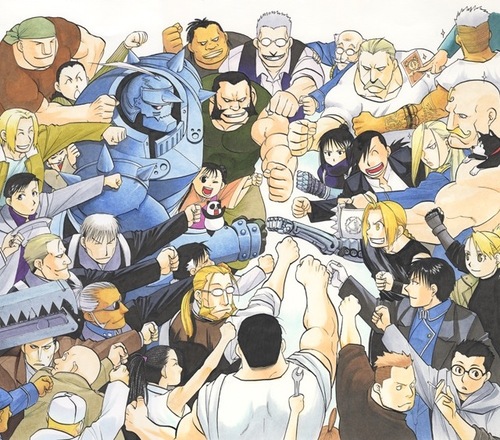
Fullmetal Alchemist
Through this overview of Arakawa’s work, we’ve seen that it contains a lot of interesting and complex themes. The overall worldview she seems to be trying to promote is one where social issues are considered, diversity of background is important, people supporting each other is paramount, anger is needed, and all human life has value. Arakawa tries to leave her readers with the feeling that they can work to make the world a better place. While obviously the issues she tackles are ones with a lot of complexity, and I would never say she’s flawless in how she deals with them, I find her work to be an overall positive experience.
However, as mentioned above, there has been debate over how she handled disability and racial oppression. And as you can tell from above, other issues to watch out for in Arakawa’s work include: depicition of genocide; child murder and abuse; and body horror, gore, suicide, and lots of character death in Fullmetal. There is also an instance of sexual harassment being treated somewhat lightly, though the character who commits it is morally ambiguous and the victim makes it clear she doesn’t find it funny later. Silver Spoon depicts animal death quite a lot, along with emotional abuse.
Silver Spoon
If you want to check out Arakawa’s work, the Fullmetal Alchemist manga is available from Viz Media and on Amazon (in box set, individual volumes, and 3-in-1 omnibuses). The Fullmetal Alchemist: Brotherhood anime is available on Funimation’s website and YouTube Channel, plus on Hulu, Netflix, and Amazon. There is another anime adaptation of Fullmetal that was made in 2003, but it is very loosely based on the manga and diverges dramatically. Many of the characters, themes, and events discussed in this article are not present there. The Silver Spoon anime is available on Crunchyroll and Hulu and is available for purchase at Aniplex and on Amazon. The manga has yet to be licensed.
If you found this article interesting, please tune in tomorrow for the final piece in this series—a look at how Fullmetal Alchemist and Silver Spoon represent women!
Caitlin Donovan is a longtime comic geek and internet blogger who is currently working on her MFA and her first novel. She formerly wrote for Big Shiny Robot and for a time helped run the blog When Fangirls Attack. These days, she mostly can be found blogging on her Tumblr, Lady Love and Justice.
Are you following The Mary Sue on Twitter, Facebook, Tumblr, Pinterest, & Google +?



